Day 1 of ISTR LAC: ‘Las estrellas aconsejan pero no obligan’ or; ‘The stars advise but do not oblige’.
And then the big day arrived. After months of dreaming and working voluntarily with a wonderful group under the tutorship of Professor Mario Aquino Alves, we began today what is the main meeting of researchers on civil society in Latin America (and perhaps the world): the conference of the International Society for Third Sector Research – Latin America and the Caribbean, at FGV EAESP – the Getulio Vargas Foundation’s São Paulo School of Business Administration.
The rain outside was no indication of the high spirits and very high-level discussions we had all day at the PhD Seminar. We talked about philanthropy, Maré favela (in Rio), crowdfunding, public health systems both in Salvador (Brazil) and in Lagos (Nigeria), and, of course, mental health in research – a very important subject for PhD students.
I was grateful to learn from such great people as Morgana Martins Krieger, Bruna de Morais Holanda and Aline Gonçalves Videira de Souza, as well as to meet so many other colleagues who, like us, are trying to bridge the gap between theory and practice in this vast and hotly contested field of social change. Here’s a tip for anyone who wants to, or can become a member of ISTR.
And days 2, 3, 4 and 5 were still to come!
How good it is to oxygenate the ideas, knowledge, and know-how of what moves us, eh?
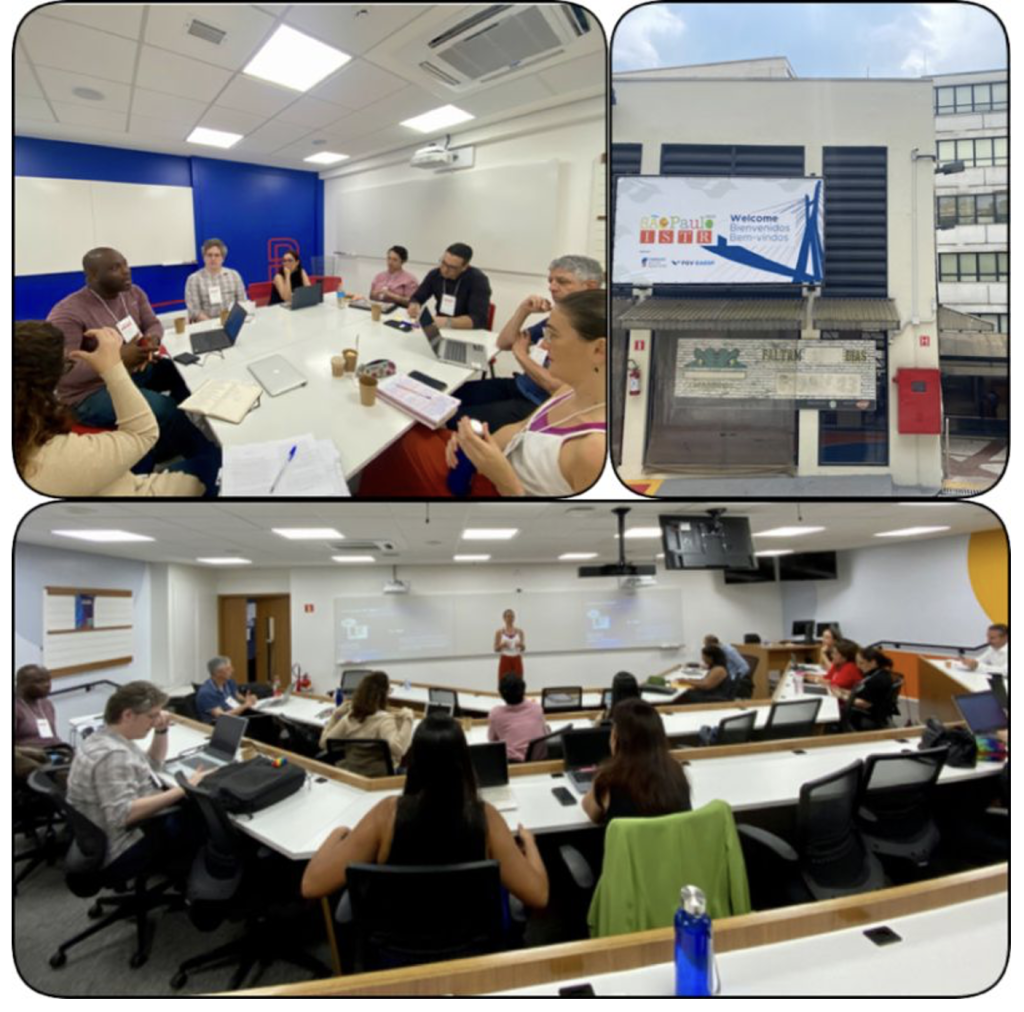
Day 2 of ISTR LAC (International Society for Third Sector Research): ‘Courage’.
Today we continue to delve deeper into our research, talking about OTHER development (yes, in capital letters!), community banks, the prison system and community councils. And we talk about slowing down, in time, both for research and for social change to spiral. In Bixiga neighbourhood (São Paulo) or the Amazon.
In Sampa da Garoa[1], we walked from one of the most elite business schools in the country to the welcoming Ocupação 9 de Julho [2], where researchers from Latin America and Africa got to know the space and its struggles, as well as enjoying a wonderful lunch. At a provocative exhibition there too, everyone suddenly spoke the same language: that of (non-hegemonic) art.
Speaking of art, we also reflected on the state of the art of research in Latin America and listened to presentations by various colleagues (special congratulations to Aline Gonçalves Videira de Souza, who aced it and won the prize).
And, of course, there was happy hour, because no one is ironclad, even more so this weekend, and I had the opportunity to learn about the current revolutions in the former French colonies in Africa from the perspective of my newest friend, Soji Adedipe, a citizen of the world and researcher at the University of Kansas, who also told me how much of Nigeria, his native country, he found on this side of the Atlantic, in Salvador, the city where he studies the SUS (Brazilian public health system), whether through Yoruba or Candomblé: ‘It’s centuries of African culture kept in Brazil’.
Next day: the official opening and the exchange of knowledge between people from all over the world!
PhD students, professors, and a representative of a social movement at Ocupação Nove de Julho.
ISTR LAC – Day 3: ‘The landscape doesn’t need to be changed, the narrative about the landscape can be different.’
On this first official day of the conference, many nostalgic and emotional hugs were mixed with critical and affective discussions about knowledge, research, and education.
We listened, talked, and reflected on methodologies outside the dominant currents, the decolonisation of the university and academia, philanthropy, research, and law. On paradoxes, discomfort, changing the status quo (or not). A more communitarian science, in every sense of the word.
We also delved into the subject of populism today and its implications for civil society in various parts of the world, a topic well connected with the following session on CSOs in Brazil, Nepal, and Poland.
In a circle (whew!), we talked about engaged research (the one I believe in the most), before closing in style by learning from Athayde Motta, our keynote speaker: ‘We need to build a civil society voice in Brazil’.
There’s more tomorrow! #ISTR International Society for Third Sector Research
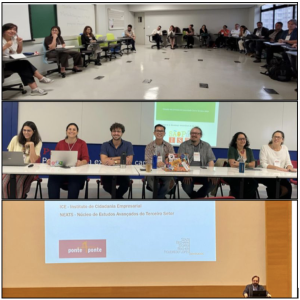
ISTR LAC day 4: a pracademic who believes in buen vivir even during the inanition of civil society, which is sometimes more uncivil?
Have you ever heard of this weird term ‘pracademic’, a mix of ‘practitioner*’ and ‘academic’ (in that order)? That person who is a committed hands-on activist, and, at the same time, has one foot (sometimes two…) in academic research and knowledge production?
The person who first called me that was my mentor, Mario Aquino. And I immediately recognised myself in that place (although I also agree with dear professor Teo that, from a Freirean perspective, everyone could be pracademic and that we need to be careful with this kind of nomenclature). Well, today was the day to reflect on this ‘non-concept’, at the launch of a network of pracademic people at the ISTR.
Afterwards, I learned a lot from a very special pracademic, Tiana, who presented the concept of the ‘starvation cycle in CSOs’, which we urgently need to talk about (eager to read her dissertation, supervised by Fernando!). On the same panel, through the work of Tatiana and Ana, we debated solidarity economy, as well as its intersections, both with public policies in Bahia and with impact businesses (in this case, recognising the tensions of different ontological perspectives – sometimes irreconcilable, in my opinion).
And my mind was already racing with the previous sessions. The day started at dawn, reading abstracts and articles so that I could have the honour of moderating a cross-cutting discussion on uncivil society, macro-politics in education and from concept to practice, whether in the 9 de Julho Occupation or in contracts, with Aline, Andrea, Catarina, Debora, and Mario. We reflected self-critically on the competing visions and inconsistencies of the system (which we researchers are part of and feed, in various layers).
Not only that, there was also a powerful discussion on civic space and civil society (the central theme of my doctorate), led by the great Kees. We also talked about social movements and CSO governance in this panel in which, for the first time, I held in my hands the book ‘Civil Society Responses to Changing Civic Spaces’* – which I co-authored with Patricia and Leticia – and several other international researchers.
And tomorrow there will be a roundtable on institutional development, promoted by Plataforma Conjunta, the presentation of an article on different concepts of philanthropy…
*The book can be downloaded for free here: https://lnkd.in/dHyFs_6Q
Day 5 – the last – of ISTR LAC: between knowledge and affections
With the theme ‘Civil society in times of democratic reconstruction and the climate crisis’, today saw the end of the International Society for Third Sector Research Conference for Latin America and the Caribbean, at the Getulio Vargas Foundation’s São Paulo Business School (FGV EAESP).
And in style: we started with the panel organized by Plataforma Conjunta, alongside Erika Sanchez Saez, Luana Braga Batista and Fernando do Amaral Nogueira, entitled ‘How can the production of academic knowledge contribute to the institutional development of civil society organisations?’. In it, we presented our pre-mapping of funding organisations that support indirect costs in Brazil.
Finally, together with Andressa Garcia, we presented the ponteAponte study ‘Philanthropy(ies) – an attempt at political-conceptual organisation based on practice’, in which we analysed 12 characterisations of philanthropy (from collaborative to venture philanthropy). Quite a debate – we’re only just getting started!
In the next room, Camila Aloi (thanks for the delicious lunch!) spoke about the Coalition for Impact, among many other great presentations!
There were many more hugs, energising exchanges of affection between such special researchers from the Global South with so much knowledge to share with this complex world.
I’m exhausted. But happy. Very happy. Nourished and grateful to leave these five days full of new ideas, friendships and inspirations that will last a lifetime.
See you in Antwerp, 2024.
Cássio Aoqui is a PhD Candidate (University of São Paulo) and ISTR member. Cássio was part of the ISTR LAC local host committee in 2023. As a journalist and with a MSc. in Administration, Cássio has been working with philanthropy for around two decades.


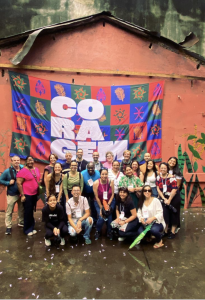
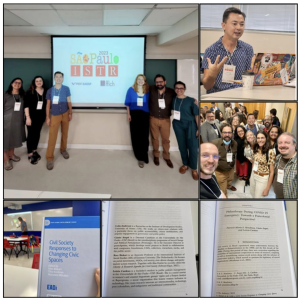
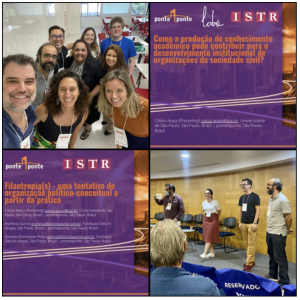

Comments (0)